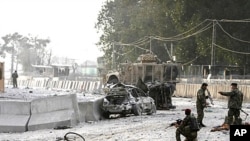At least nine people have been killed by a suicide car bomb attack near a regional airport in Jalalabad, according to Afghan police. The attack is the latest incident of violence, following a string of protests about the accidental burning of Qurans by U.S. soldiers in Afghanistan. The violence has led to some aid organizations to curtail their work.
Monday’s car bomb blast took place in eastern Afghanistan around dawn, when witnesses said the attacker drove to the airport gates before detonating the explosion.
Most of the victims appear to be Afghan civilians and security guards. NATO officials said the attacker did not breach the airport defenses.
A Taliban spokesman claimed responsibility, saying it was the latest act of revenge for the burning of Qurans at the Bagram air base north of Kabul.
The accidental destruction of the Islamic holy books has sparked protests across the conservative Muslim country. NATO officials say not all of the violence can be attributed to the Taliban.
Brigadier General Carsten Jacobson, spokesman for NATO's International Security Assistance Force, says the Taliban often claim credit for attacks to exaggerate their operational ability and influence.
“In the moment, with the tense situation that we see all over Afghanistan, they use every opportunity to claim that actions are actually executed by them, planned by them or leading into their direction,” said Jacobsen.
Apologies from President Barack Obama and other U.S. leaders for the Quran burning incident have so far failed to dampen the anti-American demonstrations and attacks across the country.
The protests have killed more than 30 people, including four U.S. military personnel. Two of the U.S. officers were killed by a suspected Afghan intelligence official who remains at large.
Despite the ongoing violence and worries about how it could affect the critical effort to train Afghan security forces, the U.S. ambassador to Afghanistan said Sunday that Washington should not withdraw troops ahead of schedule. Under an international agreement, foreign combat forces are to leave Afghanistan by the end of 2014.
To leave on schedule, foreign troops are focused on training Afghan security forces to take over. Although many outside observers have said that the training effort remains mired in problems, General Jacobson says Afghan police have handled the thousands of protesters this past week in a professional manner.
“This is a different police than what we have seen two or three years ago. It executed its duties with great skill, with great calm and with great patience. And, it managed to diffuse many situations that could have turned very critically otherwise,” he said.
Other groups are reconsidering their operations in Afghanistan. Mohammad Hashim Mayar with the Agency Coordinating Body for Afghan Relief says the protests and attacks have hampered the work of many aid organizations in the country.
“They have to restrict movement and maybe sometimes they cannot go to the projects. And, they cannot implement work in the field, you know during the demonstrations, but if there are no demonstrations the work in the field will go on regularly,” he said.
In Washington, a U.S. Defense Department spokesman said the Afghan defense and interior ministers were postponing scheduled trips to the United States this week.
Observers say the deteriorating security situation also could add to pressure on NATO allies in Europe, where the bloody and expensive war already is deeply unpopular, to accelerate plans to leave Afghanistan.




